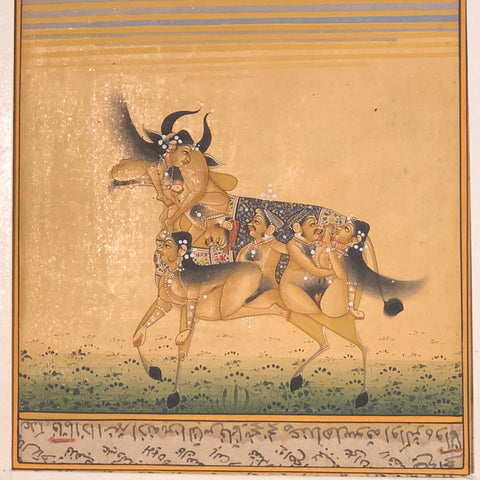Free Shipping!
Mughal Miniature painting of a Bull - erotic
Beautiful painting on old manuscript paper ; zoomorphic erotica.
A manuscript page from a portfolio of erotic themed animal portraits.
Collected in the 1970's; excellent quality; fine brushwork; brilliant color.
Matted dimensions: 7” x 11”
manuscript paper: 6” x 9”
interoir frame : 4.5” x 6”
'Mughal Painting
Generally made as miniatures either as book illustrations or as single works, Mughal painting evolved from the Persian school of miniature painting with Hindu, Buddhist and Jain influences. These paintings evolved during the rule of various Mughal Emperors in India. The paintings often revolved around themes like battles, legendary stories, hunting scenes, wildlife, royal life, mythology, etc. These paintings also became an important medium to narrate the tall tales of the Mughal emperors. This art form became so popular that it eventually made its way to various other Indian courts as well. The Victoria and Albert Museum in London houses a large and impressive collection of Mughal paintings.
Before the rise of the Mughal Empire in India, the Delhi Sultanate ruled over most parts of the Indian subcontinent. Miniature painting was already evolving in various regions from around 10th century and it continued to flourish in various regional courts during the Delhi Sultanate. When Humayun, the second Mughal emperor, returned from his exile, he brought along with him two eminent Persian artists – Mir Sayyid Ali and Abd al-Samad. Based on Humayun’s instructions, these Persian artists created many famous paintings, including the ‘Khamsa of Nizami.’ These paintings deviated from the traditional style of Persian art and hence a new style of art form called ‘Mughal Painting’ was born. Mughal paintings were further developed by subsequent Mughal emperors.
The Mughal painting soon became popular among rulers as they found the idea of portraying themselves interesting and royal in many ways. It was also a great artistic medium to display their bravery and achievements. After the death of Humayun, his son Akbar took up and expanded his father's library. He also showed great interest in arts and the Mughal painting flourished under his reign. The impetus it received during the reign of Akbar made the Mughal painting further more famous, and it was taken forward by Shah Jahan and Dara Sikoh. '
Thank you for your interest in my curated selection of rare and unusual pieces! We have taken pride for over 20 years in our excellent reputation, and strive to satisfy our clients' exact needs. Please note that we take great care in accurately describing our items, and we support that with a money back guarantee. If you receive a product that is not as described, we will promptly refund the cost once the item has been returned in good order. If you have any questions or require further images/information in order to make a decision please do not hesitate to contact us.
Thanks and Best Regards,
David Dixon and the Strange Imports Team
www.strangeimports.com








